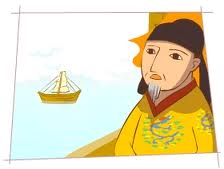瞞天過海
Fool the Emperor to Cross the Sea
原文 Content
備周則意怠;常見則不疑。陰在陽之內,不在陽之對。太陽,太陰。
英文注釋:Moving about in the darkness and shadows, occupying isolated places, or hiding behind screens will only attract suspicious attention. To lower an enemy's guard you must act in the open, hiding your true intentions under the guise of common every day activities.
探源 Origin

英文:In 643 AD, Emperor Taizong of Tang baulked from crossing the sea to a campaign against Koguryo. His general Xue Rengui thought of a stratagem to get the emperor across and allay his fear of seasickness: on a clear day, the emperor was invited to meet a wise man. They entered through a dark tunnel into a hall where they feasted. After feasting several days, the Emperor heard the sound of waves and realized that he had been lured onto a ship! General Xue drew aside the curtains to reveal the ocean and confessed that they had already crossed the sea: Upon discovering this, the emperor decided to carry on and later completed the successful campaign.
中文:公元643年,唐太宗大舉攻打高句麗卻因渡海而畏縮不前。旗下大將薛仁貴想出了一個計謀來克服皇帝的暈船恐懼癥。在一個晴朗的日子里,唐太宗被邀請去見一位賢人。他們穿過一漆黑的地道到達一大廳之上并在那里大肆宴席。歡娛數日后,皇帝忽然聽見波濤洶涌之聲,愕然意識到自己竟被蒙騙上了船。這時薛將軍揭開四周的帷幕,告訴大家他們正航行在大海之上,并已順利地渡過了海。經過這件事情后,唐太宗決定繼續戰斗并最終取得了勝利。
詞匯 Vocabularies
stratagem: 策略,計謀;和strategy不同,stratagem含有詭計,把戲的意味,而strategy則指單純的戰略,策略
suspicious: 猜疑的,多疑的
guise: 外表,偽裝
baulk: 同balk,(遇見困難或不愉快的事)畏縮不前,猶豫
allay: 緩和,減輕?
lure: 引誘,誘惑
confess: 坦白,承認
carry on: 繼續做,堅持;注意如果carry和on中間多了一橫,寫作carry-on, 就變成一個名詞,表示“大驚小怪”、“不得體的行為”或“隨身攜帶的行李”
總結 Summary
“瞞天過海”是一種欺騙的大智慧、大學問,講究的就是欺騙的隱蔽性和無影無形。隱蔽在那里?隱蔽在天天見的事物中!怎么個無影無形法?因為平常得讓他不知不覺。
相關閱讀
(來源:滬江英語 編輯:崔旭燕)